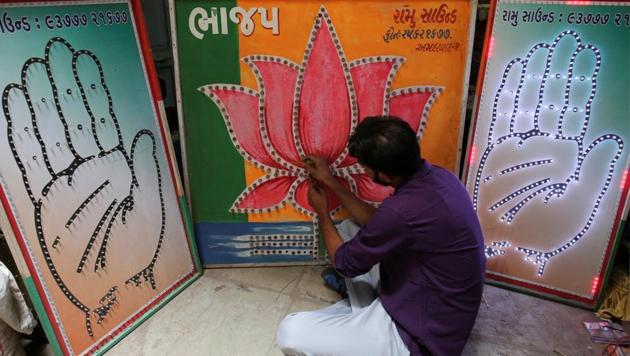The three macro predictions for 2019
Unless 2019 throws up a surprise in favour of the Congress, like 2014 was in favour the BJP, Narendra Modi and his party will continue to remain the central axis of India’s political wheel in the foreseeable future
The battle for 2019 is in its last lap. Between May 19, the last phase of voting and day of release of exit poll numbers, and May 23, when the counting will happen, we will be deluged with predictions and theories. None of the methods, which are used to arrive at such conclusions, is infallible. Looking at historical data is useful to understand long-term political trends, but they are of little use in predicting a watershed election such as 2014. Reportage can always end up overemphasising or underestimating the local versus macro contradictions in an election. And last but not least is the classic problem posed by the conversion of vote share into seat share in a first-past-the-post system. For example, with exactly the same levels of vote share, the 2014 and 2019 seat shares in Uttar Pradesh may well be drastically different because of the alliance of the Samajwadi Party (SP) and Bahujan Samaj Party (BSP).

Even with these caveats in place, though, it is possible to arrive at three macro predictions regarding the two major national parties and non-Congress and non-Bharatiya Janata Party (BJP) parties.
The Congress will bounce back from what appeared to be a terminal decline after the 2014 debacle. The BJP, irrespective of its seat tally, will have expanded into regions where it has not had much traction on its own until now. And the regional parties will increasingly come under pressure to shed their go solo approach to politics even in their strongholds.
In the six states – Himachal Pradesh, Uttarakhand, Rajasthan, Madhya Pradesh, Chhattisgarh and Gujarat – which saw a direct contest between the Congress and the BJP in 2014, the BJP won 97 of 100 Lok Sabha seats. This overwhelming victory led to the BJP embarking on the mission of making a Congress-Mukt Bharat. This slogan has not even been used once in the 2019 campaign. Here’s why. Post-2014, anti-incumbency has been the most important factor in assembly elections in these states. The BJP wrested Uttarakhand and Himachal Pradesh from the Congress, while the Congress defeated the BJP in the key Hindi belt states of Rajasthan, Madhya Pradesh and Chhattisgarh. Even in Gujarat, Narendra Modi’s home state, the Congress managed to make a big dent in the BJP’s 2012 tally. The seat share of the Congress and the BJP notwithstanding, the Congress-Mukt Bharat story of 2014 is unlikely to repeat itself in 2019 in these states. This is the most important achievement for the Congress after its 2014 debacle.
A Congress/United Progressive Alliance (UPA) revival in direct contest states and possible setbacks from the SP-BSP alliance in Uttar Pradesh can make a significant dent in the BJP tally when compared to 2014. Even if such reverses were to happen, it will be wrong to interpret these as signs of long-term reverses for the BJP. The BJP will still end up as the single largest party in the Lok Sabha. Even a repeat of the 2004 outcome will not take the Congress ahead of the BJP. The biggest reason being that the Congress does not have the Andhra Pradesh advantage it had in 2004 and 2009. The other long-term advance for the BJP in 2019 will be the gains it will make in the eastern states of West Bengal and Odisha. Irrespective of the actual number of seats it gets in these two states, it is well set to significantly increase its vote share and establish itself as the main challenger to the Trinamool Congress (TMC) and the Biju Janata Dal (BJD). This means that the BJP will be the default beneficiary of anti-incumbency in both these states in the future.
The rise of the BJP as the new dominant force of Indian politics has also led to a significant change in the behaviour of non-Congress and non-BJP parties. The biggest proof of this is the coming together of the erstwhile adversaries, SP-BSP in Uttar Pradesh. Uttar Pradesh is not the only such state. In Karnataka, the Janata Dal (Secular) has tied up with the Congress, its traditional rival. In Tamil Nadu, the Dravida Munnetra Kazhagam has come back into an alliance after having contested separately in 2014. The Nationalist Congress Party-Congress and the BJP-Shiv Sena contested separately in the Maharashtra assembly elections which were held months after the 2014 Lok Sabha polls. These alliances have been restored in 2019. If the BJP were to increase its footprint in West Bengal and Odisha, even the BJD and the TMC might have to contemplate striking alliances with the Congress and the Left in their respective states. Andhra Pradesh is the only major state which is witnessing a contest between two regional players (the Telugu Desam Party and the YSR Congress Party) fighting without any alliances. Even the Aam Aadmi Party, which came into being fighting against the Congress, tried to forge an alliance with it in Delhi.
To conclude, one can say that unless 2019 throws up a surprise in favour of the Congress, like 2014 was in favour the BJP, Narendra Modi and his party will continue to remain the central axis of India’s political wheel in the foreseeable future.
letters@hindustantimes.com




